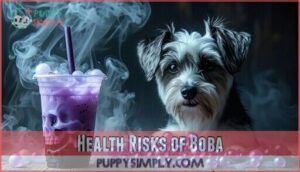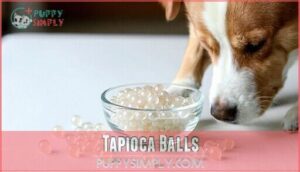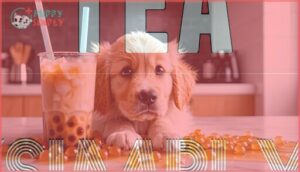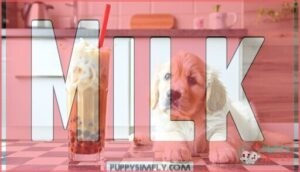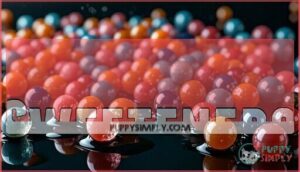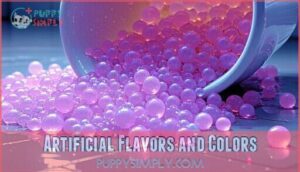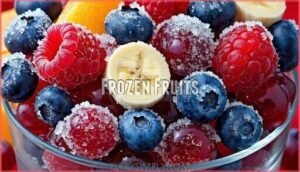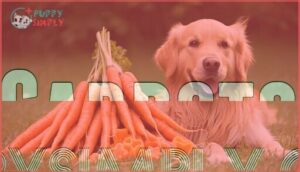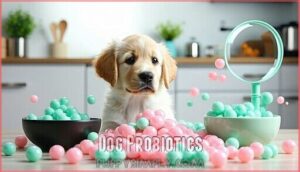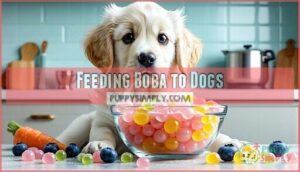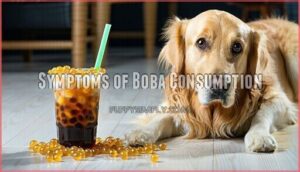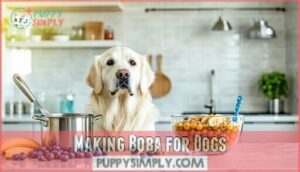This site is supported by our readers. We may earn a commission, at no cost to you, if you purchase through links.

While those chewy tapioca pearls might seem harmless, they’re actually a triple threat for your furry friend.
First, they’re a serious choking hazard since dogs don’t chew like we do.
Second, the sugar content can spike your pup’s blood glucose levels, potentially leading to digestive upset or worse.
Third, most boba drinks contain caffeine, which is toxic to dogs even in small amounts.
The milk and artificial sweeteners don’t help either, as many dogs are lactose intolerant.
Think of boba as junk food for humans – it’s definitely not meant for four-legged family members who need different nutritional considerations.
Table Of Contents
- Key Takeaways
- What is Boba
- Can Dogs Eat Boba
- Health Risks of Boba
- Boba Ingredients Effects
- Safe Boba Alternatives
- Feeding Boba to Dogs
- Symptoms of Boba Consumption
- Making Boba for Dogs
- Frequently Asked Questions (FAQs)
- Are There Any Toxic Ingredients in Boba?
- What Are the Choking and Obesity Risks of Feeding Boba to Dogs?
- Are There Any Breeds of Dogs That Should Not Be Fed Boba?
- How Much Boba Can a Dog Safely Consume?
- Are There Alternatives to Boba That Are Safe for Dogs?
- How much boba is too much for dogs?
- Can puppies eat boba safely at all?
- What should I do if my dog ate boba?
- Are there any dog-safe boba flavors available?
- Conclusion
Key Takeaways
- Don’t give your dog boba – The tapioca pearls create serious choking hazards, especially for smaller breeds, and can cause intestinal blockages that require emergency surgery.
- Caffeine in boba tea is toxic to dogs – Even small amounts can cause rapid heart rate, tremors, seizures, and potentially fatal poisoning since dogs are much more sensitive to caffeine than humans.
- Sugar and dairy cause digestive disasters – Most dogs are lactose intolerant, and boba’s high sugar content leads to vomiting, diarrhea, blood sugar spikes, and increased risk of obesity and diabetes.
- Choose safe alternatives instead – Offer frozen dog-safe fruits like blueberries, crunchy carrots, or plain cooked sweet potato to give your pup a special treat without the health risks.
What is Boba
Boba refers to both the chewy tapioca pearls and the popular tea-based drink that contains them, which originated in Taiwan and has become widely popular across the United States.
You’ll typically find this sweet beverage made with black or green tea, milk or creamer, various sweeteners, and those distinctive tapioca pearls that give the drink its characteristic texture and name, making it a unique drink with black or green tea.
Ingredients in Boba
Bubble tea’s ingredient lineup reads like a chemistry experiment gone wild.
Understanding what goes into your favorite boba drink helps you spot potential dangers for your furry friend.
Here’s what typically makes up boba ingredients dogs should avoid:
- Tapioca pearls – chewy spheres from cassava root
- Tea varieties – black or green containing caffeine
- Milk alternatives – dairy or plant-based creamers
- Sugar and artificial sweeteners creating toxicity risks
- Flavorings with artificial colors and preservatives
Tapioca Pearls
Those chewy little spheres you’re wondering about? Tapioca pearls come from cassava root starch, giving them their distinctive bouncy texture.
Traditional cooking methods involve boiling them in sugar water until they achieve that signature chewiness. While tapioca serves as an alternative thickener in many foods, the starch content alone isn’t the main concern here.
The question remains: is boba safe for dogs?
Milk and Half-n-Half
Most boba drinks contain milk or half-n-half, creating potential problems for your furry friend.
Since most dogs suffer from lactose intolerance, these dairy ingredients can trigger gastrointestinal upset including diarrhea and bloating.
The high fat content in half-n-half poses additional digestion issues, and even safe amounts can disrupt dog digestion, making dairy alternatives a smarter choice for dog dietary concerns.
Powder Creamer
What makes powder creamer so concerning for dogs?
This artificial substitute contains hydrogenated oils, corn syrup, and harmful artificial additives that spell trouble for your furry friend.
Palmitic acid and sodium caseinate create digestive chaos, while artificial sweeteners pose serious health risks.
Unlike natural milk, powder creamer offers zero nutritional value but delivers maximum danger to dogs consuming boba, posing a significant threat due to its artificial additives.
Can Dogs Eat Boba
The short answer is no – dogs shouldn’t eat boba. While plain tapioca pearls aren’t toxic, most commercial boba contains ingredients that can harm your furry friend. The boba nutritional value offers zero benefits for dogs, and boba toxicity levels vary depending on preparation methods and additives.
**Skip the boba completely – your dog’s health isn’t worth risking caffeine poisoning, choking hazards, and digestive disasters for zero nutritional benefit.
If your dog ate boba, don’t panic, but monitor them closely. Store-bought versions often contain caffeine, dairy, artificial sweeteners like xylitol, and excessive sugar – all problematic for canines. Dog boba risks include choking hazards, digestive upset, and potential poisoning from harmful ingredients.
One alternative treat with potential benefits is gelatin, as it can help support connective tissue health.
Key concerns when dogs and boba mix:
- Caffeine from tea can cause heart palpitations and seizures
- Dairy products trigger digestive issues in lactose-intolerant dogs
- Artificial sweeteners may lead to dangerous blood sugar drops
So is boba safe for dogs? The safest approach is avoiding it entirely and choosing dog-friendly alternatives instead.
Health Risks of Boba
While you might think sharing your favorite boba drink with your furry friend sounds harmless, several serious health risks make this treat dangerous for dogs.
The combination of caffeine, high sugar content, choking hazards from tapioca pearls, and potential toxic ingredients can lead to digestive upset, blood sugar spikes, and even life-threatening complications.
Choking Hazard
Tapioca pearls pose a serious choking hazard for dogs due to their size and chewy texture.
Your dog’s swallowing reflex can’t handle these dense spheres, especially in smaller breeds where breed susceptibility increases dramatically.
Chihuahuas are particularly vulnerable, as they’re prone to tracheal collapse symptoms.
| Risk Factor | Small Dogs | Large Dogs |
|---|---|---|
| Pearl Size Impact | High risk | Moderate risk |
| Swallowing Reflex | Overwhelmed | Challenged |
| Intestinal Blockage | Severe | Possible |
| Difficulty Breathing | Immediate | Delayed |
Prevention methods include keeping boba away from pets entirely, while emergency actions require immediate veterinary intervention to prevent intestinal blockage and ensure the dog’s safety, thus avoiding severe consequences.
Digestive Upset
Most dogs experience gastrointestinal distress when consuming boba due to lactose intolerance from milk ingredients.
You’ll notice bloating symptoms, vomiting, and diarrhea as your dog’s gut bacteria struggles to process dairy.
The tapioca pearls can cause upset stomach or intestinal blockage, while artificial additives trigger additional vomiting causes, requiring immediate diarrhea relief measures.
Sugar Overload
Beyond the chewy texture, boba’s sugar content creates serious health concerns for your furry friend.
High sugar levels can trigger dangerous spikes in blood glucose, leading to hyperactivity followed by crashes.
- Obesity Risk – Regular sugar intake causes weight gain and dog obesity
- Dental Decay – Sweet treats damage teeth and gums
- Diabetes Link – Excessive sugar consumption increases diabetes development risk
Intoxication From Caffeine
While sugar poses serious concerns, caffeine in boba tea creates an even more dangerous situation for your furry friend.
Most bubble teas contain black or green tea, both packed with caffeine that triggers severe toxicity in dogs. Your dog’s caffeine sensitivity means even small amounts can cause rapid heart rate increases and potentially life-threatening seizures.
Even a small amount of caffeine can be dangerous, as dogs have a higher caffeine sensitivity.
| Toxicity Levels | Symptoms | Treatment Options |
|---|---|---|
| 9 mg per pound | Rise in heart rate | Immediate vet care |
| 20-40 mg per kg | Tremors, vomiting | Decontamination |
| Severe cases | Seizure risk | Supportive monitoring |
| Fatal range | Collapse, death | Emergency intervention |
Dog caffeine poisoning from boba toxicity dogs face requires urgent veterinary attention, as symptoms can persist for 12-48 hours after consumption.
Allergic Reactions
Sometimes your furry friend’s body rebels against boba ingredients, triggering uncomfortable allergic reactions.
Watch for telltale symptoms like itching, skin inflammation, hives and swelling around the face or paws.
Gastrointestinal distress often follows, causing vomiting and digestive upset.
Severe dog boba reactions might include respiratory issues, making breathing difficult, and these warning signs demand immediate veterinary attention.
Boba Ingredients Effects
You need to understand how each boba ingredient affects your dog’s health before sharing your favorite bubble tea.
Each component, from tapioca pearls to artificial sweeteners, carries specific risks that can cause serious health problems for your furry friend.
Tapioca Balls
Made from cassava root, tapioca pearls dogs can safely consume in tiny amounts, but texture impact creates serious choking risks.
These chewy spheres contain 89% carbohydrates with minimal nutrition. Safe quantities mean just one or two pearls for large dogs, none for small breeds.
Pearl variations often include harmful additives, so plain cooking methods work best when considering boba tea dogs safety. The pearls’ texture comes from tapioca starch.
Tea
Tea forms the backbone of most boba drinks, but it’s basically poison for your pup.
The caffeine content in green and black teas can send your dog’s heart racing like they’ve run a marathon. Even small amounts trigger dangerous symptoms that’ll have you rushing to the emergency vet.
Here’s what tea does to dogs:
- Rapid heartbeat – Their heart pounds unnaturally fast
- Muscle tremors – Uncontrollable shaking throughout their body
- Restlessness – They can’t settle down or relax
- Breathing difficulties – Panting becomes labored and concerning
- Potential seizures – In severe caffeine poisoning cases
Safe Tea Alternatives like chamomile or peppermint offer caffeine-free options, though plain water remains best. Tea Caffeine Levels vary, but all traditional teas pose health risks.
Herbal Tea Options might seem safer, but many contain compounds that aren’t dog-friendly. When boba tea dogs encounter these drinks, the Tea Health Benefits humans enjoy become serious dangers. Artificial sweeteners often hide in flavored teas, doubling the threat.
Skip the tea entirely – your dog’s safety isn’t worth the risk.
Milk
Most dogs struggle with lactose intolerance, making milk in boba a recipe for digestive disaster.
Your pup’s system can’t properly break down dairy, leading to uncomfortable symptoms that’ll have them feeling ruff.
| Milk Component | Dog Health Impact | Common Symptoms |
|---|---|---|
| Lactose | Digestive upset | Diarrhea, vomiting |
| Fat content | Weight gain risk | Bloating, discomfort |
| Dairy proteins | Allergic reactions | Skin irritation, gas |
Sweeteners
Sweeteners in boba pose serious threats to your dog’s health.
Sugar leads to obesity and diabetes, while artificial sweeteners create even deadlier risks.
Xylitol toxicity can cause liver failure within hours, and stevia concerns include digestive upset.
Even natural options like honey carry risks for dogs with compromised immune systems.
- Xylitol can kill your dog – This artificial sweetener causes rapid blood sugar drops and liver damage
- Sugar addiction starts here – High sugar content creates cravings that lead to obesity and diabetes
- Hidden dangers lurk – Aspartame and stevia cause digestive distress you won’t see coming
Artificial Flavors and Colors
Since artificial flavors and additives in boba can trigger allergy symptoms, you’re playing with fire when sharing these treats.
These synthetic flavorings cause digestive problems and behavioral changes in sensitive dogs. Long-term effects include potential cancer risks from repeated exposure.
Artificial sweeteners pose serious dog poisoning threats, making commercial boba’s colorful additives dangerous territory for your pet’s health, due to the potential for dog poisoning.
Safe Boba Alternatives
If you want to give your dog a special treat that mimics the boba experience, several safe alternatives can satisfy their craving without the health risks.
Frozen fruits like blueberries and strawberries, crunchy carrots, and dog-specific probiotics offer healthy options that provide texture and flavor your pet will enjoy.
Frozen Fruits
If you’re searching for safe alternatives to boba, frozen fruits hit the spot—think blueberries or bananas.
The freezing process locks in nutritional benefits, making them a delightful treat for dogs.
Fruit safety is key, so keep serving sizes small and avoid grapes or cherries.
Many owners find frozen fruit options are a great treat, and DIY recipes let you customize dog treat boba to boost your dog’s nutrition.
Carrots
When you’re looking for a crunchy alternative to boba, carrots make an excellent choice for your furry friend.
These orange vegetables offer natural sweetness without the risks associated with tapioca pearls. You can find carrot-related dog products online.
- Carrot Benefits: Low-calorie option packed with beta-carotene and fiber for digestive health
- Carrot Preparation: Wash thoroughly, peel if desired, and cut into appropriate bite-sized pieces
- Carrot Quantities: Start with small portions to avoid digestive upset in sensitive dogs
- Carrot Variety: Baby carrots work well for smaller breeds, while larger dogs can handle full-sized pieces
- Carrot Alternatives: Consider other safe vegetables like sweet potatoes or green beans for variety
Dog Probiotics
Beyond crunchy treats, probiotics offer superior digestive support for your dog.
These beneficial bacteria promote gut health, boost immune support, and provide allergy relief while supporting skin health.
Probiotics aid digestion far better than questionable boba ingredients, making them ideal for canine nutrition and resolving intestinal issues naturally.
| Probiotic Strain | Primary Benefit | Best For |
|---|---|---|
| Lactobacillus acidophilus | Digestive health improvement | Daily wellness support |
| Bifidobacterium animalis | Immune support enhancement | Seasonal health changes |
| Bacillus coagulans | Diarrhea reduction | Post-antibiotic recovery |
| Enterococcus faecium | Stool quality improvement | Chronic digestive issues |
| Saccharomyces boulardii | Inflammation control | Allergy management |
Feeding Boba to Dogs
If you’re considering sharing boba with your dog, you’ll need to make careful choices about ingredients and preparation methods.
Most commercial boba contains harmful additives like caffeine, dairy, and artificial sweeteners, but you can create safer alternatives using plain tapioca pearls and dog-friendly ingredients.
Select Plain Tapioca Pearls
If you’re considering giving your dog boba, pearl sourcing matters most.
Choose plain, unflavored tapioca pearls without added sugars or artificial ingredients.
Cooking methods should involve only water—no sweeteners or flavorings.
Check texture variations carefully, as overly chewy pearls pose choking risks.
Store properly in airtight containers.
Remember, even dog-safe tapioca pearls offer minimal nutritional value as dog treats.
Avoid Milk and Half-n-Half
Skip milk and half-n-half entirely when preparing boba for dogs. Most dogs suffer from lactose intolerance, causing digestive upset, diarrhea, and bloating.
Instead, use dairy alternatives like plain water or unsweetened coconut milk for safe hydration. Considering that dogs are often lactose intolerant, it’s best to avoid dairy altogether.
Your homemade recipes should prioritize digestive health over taste. This simple swap protects your dog from unnecessary stomach troubles while maintaining the fun texture, which is a key aspect of safe hydration and overall wellbeing.
Limit Sugar Intake
Sugar’s a sneaky culprit in boba that can trigger diabetes and weight gain in dogs.
Practice portion control by reading labels carefully – many contain artificial sweeteners that are downright dangerous. Consider gradual reduction if your pup’s already hooked on sweet treats.
Swap sugary boba for healthy treats and sugar alternatives like plain fruit to keep your furry friend safe.
Symptoms of Boba Consumption
If you’ve given your dog boba or suspect they’ve consumed some, you’ll need to watch for specific warning signs that indicate potential health problems.
Recognizing these symptoms early allows you to take prompt action and contact your veterinarian if necessary, which is crucial for addressing potential health problems.
Digestive Issues
When your dog snacks on boba, their digestive system can revolt quickly.
Most dogs suffer from lactose intolerance, making milk-based boba a recipe for disaster.
Watch for these telltale signs of gastrointestinal issues:
- Explosive diarrhea that’ll have you reaching for cleaning supplies
- Painful bloating symptoms causing visible discomfort
- Repeated vomiting from upset stomach reactions
- Intestinal blockage from chewy tapioca pearls
Blood Sugar Spikes
Boba’s high sugar content triggers rapid blood sugar rise in dogs, creating dangerous hyperglycemia risks.
You’ll notice hyperactivity followed by crashes as their insulin response struggles to cope.
These energy fluctuations stress your dog’s system, potentially leading to insulin shock.
The diabetes link becomes concerning with repeated exposure, as long-term effects include permanent metabolic damage and increased diabetes risk.
Pancreatitis
High fat content in boba can trigger pancreatitis in dogs, causing dangerous enzyme release that literally digests the pancreas from within.
You’ll notice severe abdominal pain as your dog assumes a "praying position" with front legs down.
This serious condition requires immediate veterinary care and strict dietary management.
Chronic cases may develop lasting complications affecting your dog’s health permanently, and managing this condition often requires easily digestible proteins for strict dietary management and to prevent further complications.
Dehydration
When your dog consumes boba’s high sugar content, it can disrupt their normal water intake patterns and electrolyte balance.
This imbalance may lead to dehydration, especially if they’re not drinking enough water to compensate for the excess sugar processing.
Watch for these dehydration symptoms in dogs:
- Dry, sticky gums and excessive panting
- Lethargy and loss of appetite
- Sunken eyes and reduced skin elasticity
- Dark yellow urine or decreased urination
Severe dehydration affects kidney function and may require immediate fluid therapy from your veterinarian. If you notice heatstroke signs alongside dehydration symptoms after boba consumption, seek emergency veterinary care immediately.
Making Boba for Dogs
If you’re considering making homemade boba for your dog, you’ll need to carefully select safe ingredients and avoid harmful additives found in commercial versions.
Creating a dog-friendly version requires plain tapioca pearls, sugar-free preparation methods, and complete elimination of caffeine, artificial sweeteners, and dairy products.
Homemade Boba Recipe
Creating a dog-friendly boba alternative requires careful ingredient selection and proper portion sizes.
Use plain tapioca pearls made from pure tapioca flour choice, avoiding commercial versions with harmful additives.
Combine with safe thickeners like mashed banana or plain yogurt instead of dairy milk.
Consider dog-friendly boba options for specialized ingredients.
Add dog-friendly flavors such as pureed strawberries or carrots, ensuring sweetener alternatives remain natural and sugar-free for ideal canine health.
Safe Ingredients
When making safe boba dogs can enjoy, you’ll want to stick with plain tapioca pearls as your foundation.
Choose ingredients that won’t harm your furry friend while still creating a tasty treat.
Focus on these dog-friendly components:
- Plain tapioca starch – Skip commercial pearls with added sugars
- Dog-safe teas like chamomile or peppermint for flavor
- Natural fruit purees from apples or blueberries instead of artificial syrups
Avoiding Harmful Additives
Several artificial sweeteners pose serious threats to your dog’s health.
Xylitol dangers include liver failure and blood sugar crashes, while stevia can trigger diarrhea.
Skip sugar-laden syrups and caffeine entirely.
Choose natural colors from dog-safe fruits instead of artificial dyes.
Preservative risks multiply when combining multiple additives, so stick to simple, whole ingredients for homemade treats to avoid preservative risks.
Frequently Asked Questions (FAQs)
Are There Any Toxic Ingredients in Boba?
Yes, several boba ingredients are toxic to dogs. Xylitol in flavored pearls causes liver damage, caffeine triggers heart problems, and taro contains calcium oxalate crystals causing oral irritation and poisoning.
What Are the Choking and Obesity Risks of Feeding Boba to Dogs?
Like Russian roulette with treats, boba’s tapioca pearls can lodge in your dog’s throat, creating deadly choking hazards.
The high sugar content also packs on pounds, leading to obesity and diabetes complications.
Are There Any Breeds of Dogs That Should Not Be Fed Boba?
All dog breeds should avoid boba due to choking hazards and toxic ingredients.
Small breeds face greater choking risks from tapioca pearls, while breeds prone to diabetes shouldn’t consume boba’s high sugar content.
How Much Boba Can a Dog Safely Consume?
Ironically, the "safe" amount of boba for your dog is zero.
Don’t risk it—those chewy pearls pose choking hazards, contain harmful sugars, and offer no nutritional benefits.
Skip the trendy treat entirely.
Are There Alternatives to Boba That Are Safe for Dogs?
Skip the boba and try frozen dog-safe fruits like blueberries or banana slices instead.
Carrots make excellent crunchy treats, while plain cooked sweet potato offers chewy texture without harmful additives your pup will love.
How much boba is too much for dogs?
Playing with fire comes to mind when considering boba for dogs.
Any amount is too much—even one pearl poses choking hazards and digestive issues.
You shouldn’t give your dog boba at all.
Can puppies eat boba safely at all?
No, puppies shouldn’t eat boba at all.
Their developing digestive systems can’t handle caffeine, sugar, or dairy.
The tapioca pearls pose serious choking risks and could cause dangerous blockages in their smaller throats.
What should I do if my dog ate boba?
Like a detective gathering clues, monitor your dog closely for symptoms.
If they consumed large amounts or show distress, contact your vet immediately.
Watch for choking, vomiting, or unusual behavior within 24 hours.
Are there any dog-safe boba flavors available?
No commercial dog-safe boba flavors exist.
Traditional boba contains harmful ingredients like caffeine, sugar, and artificial sweeteners.
Instead, offer your pup frozen fruit pieces or plain cooked tapioca pearls without additives as safer alternatives.
Conclusion
Like a protective shield guarding your beloved companion, knowledge becomes your strongest defense against potential dangers.
While you’ve learned that dogs can’t safely eat boba due to choking hazards, caffeine toxicity, and digestive risks, you’re now equipped to make informed decisions.
Keep those colorful tapioca pearls away from curious paws and opt for dog-safe alternatives instead.
When friends ask "can dogs eat boba," you’ll confidently share the facts while keeping your furry family member healthy and happy.
- https://candogs-eat.com/can-dogs-eat-boba/
- https://www.hepper.com/can-dogs-eat-boba/
- https://www.dailypaws.com/dogs-puppies/dog-nutrition/dog-weight-management/how-many-calories-should-my-dog-eat
- https://www.petpoisonhelpline.com/pet-tips/caffeine-poisoning-in-dogs/
- https://aercmn.com/understanding-caffeine-toxicity-in-pets/

